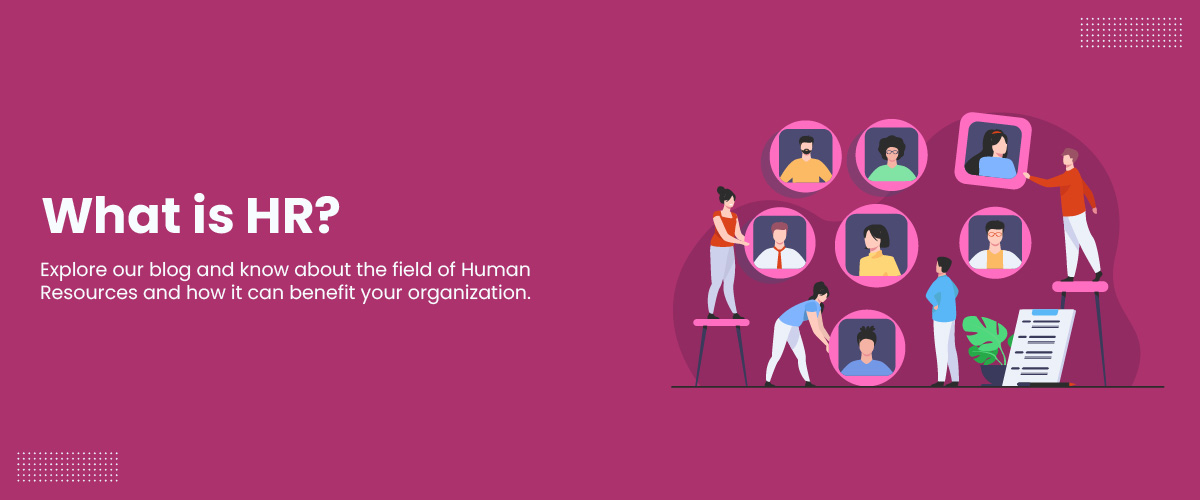What is Human Resources? – Roles, Skills, Career Scope, & More
Did you know that a country’s major economic development is achieved through human resources? 58% of companies are dependent on HR technologies for talent recruitment and retention. Every time you are hired by a company, it is through a human resource personnel. The field of human resources is a blooming career field as it is required in every business be it big or small. In this blog, we will learn what is human resources, its major roles and responsibilities, career scope, and more.
Human Resources: Overview
Human resources is a department in charge of hiring and recruiting, onboarding and training, administering employee benefits and compensation, and adhering to labor laws and regulations. There are various human resource courses that can enhance your knowledge about the HR department.
- The HR department is also important in maintaining employee relations, offering assistance and direction to the employees, and dealing with any difficulties that emerge.
- They are in charge of developing and implementing corporate rules and procedures, as well as encouraging diversity and inclusion and cultivating a healthy work culture.
- HR workers collaborate closely with other departments within the corporation, including finance, legal, and operations, to ensure that the business runs smoothly.
- They are also in charge of designing and implementing strategies to recruit and retain top personnel, as well as increase employee engagement and productivity.
Why are Human Resources Important?
Human resources is crucial for enhancing the productivity and efficiency of an organization. Here are some of the major reasons why human resources is important:
Better Management
HR handles several tasks ranging from recruitment to ensuring compliance. All of these require a team that strategically manages the employees and motivates them to perform better and in alignment with the organization’s mission and vision.
Talent Acquisition and Management
The HR division of an organization is important for ensuring the right candidates are selected and hired for the right job roles. They also help in retaining this talent by developing competitive and attractive salary and benefits packages.
Productivity and Motivation
The HR ensures the employees stay motivated and feel satisfied, so they can put in their best efforts and continue to be productive. This helps the business meet its goals and get better results.
Safety and Compliance
The HR professionals understand various safety, industrial, state, and national laws and regulations. They ensure compliance within an organization while creating a safe work environment for the employees.


HR Management Strategies
An HR strategy is vital to implement best management practices and ensure the achievement of organizational objectives. Some of the HR management strategies include:
Develop Distinct Employer Identity
The HR can create a unique identity for the organization to attract the most suitable talent. For example, you can position your company as an employer that promotes innovation in the market. This will appeal to job seekers looking for workplaces that value their ideas and creativity.
Encourage Ongoing Learning
Providing training and development opportunities motivates employees to enhance their skills and knowledge. An organization can offer certification courses or cover the cost of continuing education.
Anonymous Feedback
Another HR management strategy is accepting anonymous feedback so employees can communicate their issues. This constant communication can ensure prompt resolution of grievances.
Promote Diversity and Inclusion
When HR prioritizes diversity and inclusion in their hiring practices, they get a wider pool of talent and build a positive employer image in the market.
Emphasize Employee Well-Being
Proper lunch breaks, paid sick leaves, support for tackling personal issues, etc. are part of another HR strategy where employee well-being is at the core. This increases employee satisfaction and impacts their performance positively.
Roles and Responsibilities of HR in an Organization
The tasks of human resources vary depending on the size and structure of the organization. Here are some of its most important roles and responsibilities:
Recruitment and Selection
The HR division is responsible for recruiting the right talent for the organization. The HR professionals confirm the selection of a candidate, send them an offer letter, initiate salary negotiations, and confirm their joining date along with the completion of joining formalities like filling up documents and forms.
Onboarding and Induction
When an employee joins the organization, the HR introduces them to the team, the company’s work culture, and different rules and regulations.
Training and Development
The HR initiates training and development programs to help employees improve their skills and knowledge.
Administering Employees’ Payroll
HR has to administer the employees’ payroll, including compensation, promotions, and other benefits.
Compliance
Human resource specialists guarantee that the business complies with all employment-related rules and regulations, such as labor laws, equal opportunity legislation, and workplace safety standards. They also ensure that employees adhere to these regulations and standards while working.
Addressing Employee Grievances
HR resolves conflict and employee grievances if they arise to keep the organization functioning smoothly.
Performance Management
HR experts create and execute performance management systems to assist managers in providing feedback to employees and improving their performance.
Strategic Planning
HR professionals collaborate with senior management to establish and implement HR strategies that correspond with the aims and objectives of the firm.
Interested in pursuing a career in human resources? Explore this HR course offering placement guarantee. Become placement-ready in just four months!
What is HRM?
Human resource management (HRM) is the practice of strategically managing employee lifecycle and relations in an organization. The emphasis is on considering employees as human capital. The HRM practices focus on identifying, developing, motivating, and managing the best human capital that can be an asset for an organization.
Objectives of HRM
Objectives of human resource management can be broadly divided into four categories. These include the following:
- Organizational Objectives: These objectives are focused on increasing organizational efficiency by hiring, training, and retaining suitable employees.
- Functional Objectives: These objectives promote growth and development activities for the smooth functioning of the organization and the creation of a healthy workplace culture.
- Societal Objectives: These objectives focus on ensuring laws and regulations are followed to implement legal, ethical, and socio-environmental standards in the organization.
- Personal Objectives: HR also assists employees in achieving their personal goals, such as job satisfaction, better salaries, working conditions, promotion, social security, and more. HRM helps engage and motivate employees and provides a safe working environment for them.
Skills Required to Work as an HR
Now that you have a basic understanding of what is HR, let us try and understand what makes a good HR. Here are some of the skills you need as an HR:
- Communication Skills: These are essential because HR needs to interact with potential and existing employees, managers, CEOs, and other stakeholders. Both verbal and written communication are important for HR because they maintain relationships between employees and the organization.
- Time Management: As an HR, you will have tight deadlines to follow. Giving out the employees’ salaries on time, updating the company with recent laws, and addressing employee grievances at the earliest, require timely action.
- Strategic Skills: In the business domain, having a strategic mindset is crucial. HR professionals should have the ability to develop, optimize, and execute HR strategies for achieving organizational goals and objectives.
- Interpersonal Skills: HR is responsible for the discipline of the employees. For this, an HR needs to be friendly and approachable.
- Management Knowledge: An HR should have the ability to follow the company’s policies and manage tasks accordingly. They should have expertise in human resource management or industrial and organizational psychology to better understand the processes related to recruitment, compensation, data reporting, etc.
- Administrative Expertise: The HR professional should know how to keep records of leaves, payroll, benefits, resignations, hiring, etc. This is essential because these records help the organization make informed decisions related to many aspects of a business, like recruitment, budgeting, skill gaps, etc.
- Analytical Skills: The HR has to identify potential employees when conducting various interviews to fill positions in the company. Therefore, they should have strong analytical skills.
- Tech Savvy: Several HR functions are automated through various HR software. Therefore, human resource professionals should be well-versed with the latest technology.
A combination of the above-mentioned personal development skills and technical expertise can help any professional to excel in the role of an HR.
Human Resources Career Scope and Salary
The human resources industry is expected to grow by 12.8% annually for the next few years, projecting a good scope of job opportunities. HR professionals who desire to progress in their careers or explore more employment possibilities may benefit from specialized knowledge in a certain area of HR.
It may also help firms manage their personnel more successfully and ensure that their HR services are streamlined to fit the demands of their business. Some specializations you can explore are:
- Digital HR
- Global Talent Management
- Project Management
- Leadership
- Organizational Communications
The salary of an HR professional depends on their educational qualifications, skills, expertise, experience, job roles, and location. The average annual salary of a human resource professional ranges from ₹8 LPA to ₹15 LPA.
The following are the salaries for a human resource professional based on their experience:
| Experience Level | Average Annual Salary |
| Fresher (0-1 Year Experience) | ₹5 LPA to ₹8 LPA |
| Mid-Level Professional (1-4 Years Experience) | ₹8 LPA to ₹15 LPA |
| Experienced Professional (5+ Years Experience) | ₹15 LPA to ₹30 LPA |
These salaries vary for different companies. For instance, Amazon pays an annual salary of 2.5 LPA to 20 LPA. HCL Tech, on the other hand, pays 5 LPA to 15 LPA.
Conclusion
HR’s definition can be stated as one who plays a critical role in modern enterprises. It is always evolving to suit the changing demands of the business landscape. Good human resource management is critical for fostering a healthy work environment, recruiting and keeping top talent, and guaranteeing employee engagement and productivity. HR professionals may specialize in a variety of HR disciplines to earn specific knowledge and skills, progress in their careers, and contribute more effectively to the organization.
Did you find the blog informative? Share with us in the comments below why you think human resources is significant for any organization. Also, check out the top HR interview questions to revise basic and advanced HR concepts for your next interview.
FAQs
An HR is responsible for the recruitment of employees, managing employee relations, maintaining organizational culture, resolving workplace conflict, working towards employee engagement and motivation, and more.
Four major types of human resources include HR Administrator, HR Assistant, Employment Specialist, and Director of Human Resources.
The five major roles of an HR Manager include developing and implementing HR strategies, managing the employees’ lifecycle, handling the recruitment process, maintaining employee relations by addressing grievances, and managing compensation and benefits.
A career in human resources offers a good scope for growth and development. Apart from professional growth, the lucrative salary package is another factor that makes this domain attractive for job seekers. The annual average salary of an HR professional in India ranges from ₹5 LPA to ₹15 LPA.
Yes, human resources is a well-paid job. While the highest salary for a fresher ranges from ₹4 LPA to ₹10 LPA, the highest salary for an experienced professional ranges from ₹12 LPA to ₹30 LPA.
Some of the highest-paid HR roles include Chief Human Resources Officer, HR Director, Training and Development Manager, and Compensation and Benefits Manager.







